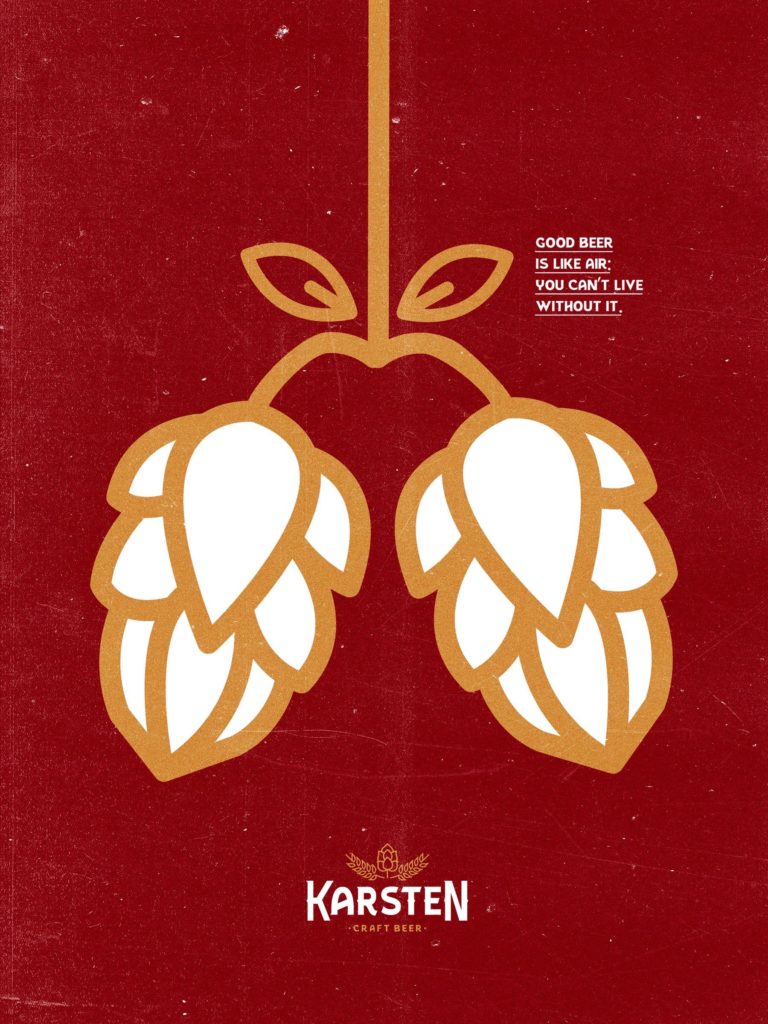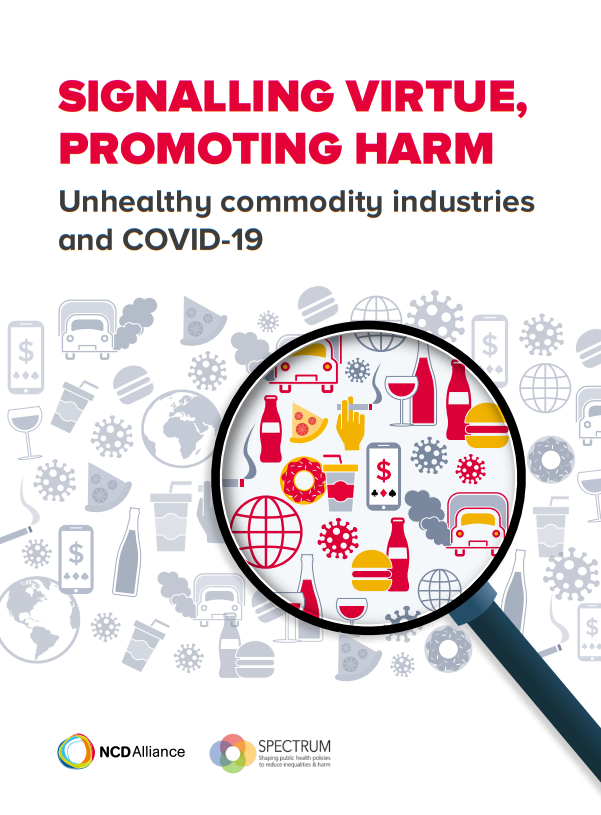Since the COVID-19 pandemic emerged Non-Communicable Diseases (NCDs) such as obesity, heart disease, lung disease, liver disease and cancer were identified as risk factors for contracting the virus and experiencing more severe COVID-19 progression. But even before the pandemic NCDs deserved urgent attention, as the world’s biggest killer, causing about 41 million deaths per year. The pandemic further exacerbated the existing health burden due to NCDs.
Movendi International reported how Big Alcohol is using the pandemic for their benefit from early on when COVID-19 hit societies. Now the NCD Alliance and the SPECTRUM Research Consortium have released a report called “Signalling Virtue, Promoting Harm: Unhealthy commodity industries and COVID-19“ which analyses how Big Alcohol and other unhealthy industries exploit the pandemic for their marketing and as political leverage.
Alcohol use along with tobacco use, unhealthy diet, lack of exercise and air pollution are the major risk factors for NCDs. Therefore, the strategies and efforts of the producers of these health harmful products in exploiting the pandemic to further their marketing, sell more products and protect their profits are unethical. It shows that even during a public health crisis, profit maximization is what matters to these Big Corporations, even at the cost of human lives.
Four main corporate strategies
The report outlines four main strategies used by these industries:
- Pandemic-tailored marketing campaigns and stunts,
- Corporate social responsibility programmes,
- Fostering partnerships with governments, international agencies and NGOs, and
- Shaping policy environments.
Since the early days of the pandemic, we have observed two trends: the growing epidemiological evidence that people living with NCDs are suffering worse outcomes from COVID-19, and that many producers of unhealthy commodities have rapidly adapted their strategies in an attempt to capitalise on the pandemic and lockdowns,” said Lucy Westerman, Policy and Campaigns Manager at the NCD Alliance and a co-author of the report, as per the NCD Alliance.
It is a bitter irony that companies such as tobacco, alcohol and junk food, whose products increase the risk of NCDs, thereby putting people at higher risk of suffering through the pandemic, have positioned themselves as heroes and partners in the response and have interfered in public policies that seek to protect population health,” added Ms. Westerman.
Lucy Westerman, co-author of the report and Policy and Campaigns Manager, NCD Alliance
Key results from the report
The report was produced through crowd sourced examples from around the world. To date, the initiative has received a total of 786 submissions from over 90 countries around the world with the most frequently cited countries being the United Kingdom and United States of America (with 119 submissions originating from each), followed by Australia (56), India, (43), Mexico (34), Brazil (29) and Jamaica (28).
A majority of the examples (363) were from the alcohol industry, followed by examples (328) from junk food and sugar-sweetened drink products.
The report highlights the following key findings:
- The consistency with which corporate actions have been selected to advance longstanding strategic priorities. Multiple initiatives publicly presented as contributions to national or international efforts to combat the pandemic and support communities were actually designed to promote brands, products and corporations whose economic interests frequently conflict with public health goals.
- The rapid adaptation of marketing and promotional activities to address a changing trade context and exploit lockdown demonstrates that a global crisis does not displace maximizing shareholder revenue as the key driver of corporate behavior.
- The appropriation of health and social justice causes and frontline workers in the guise of philanthropic initiatives illustrates how corporate social responsibility programmes are shaped by promotional priorities and constitute a specific form of marketing.
- The pandemic created new opportunities – otherwise unavailable – for unhealthy commodity companies to falsely position themselves as partners in progress for health and sustainable development with governments, international organisations, health agencies and leading NGOs.
- The volume and global reach of actions by alcohol and junk food industries demonstrate the need to advance international efforts to manage conflicts of interest.
- It is important to ensure that initiatives to address the pandemic are coherent with related health and development priorities, notably including effectively tackling NCDs. This imperative raises important questions for governments and for international organisations about their interactions with unhealthy commodity industries.
Some examples: Big Alcohol exploiting the pandemic in pursuit of profit maximization
Pandemic-tailored marketing campaigns and stunts
- Heineken Russia donated meals to health workers along with their energy drink – Solar Power – for doctors and nurses on night shift.
- In Brazil, brewer Karsten adapted their logo and slogan, to to resemble a pair of lungs – the main site of COVID-19 infection – with the slogan “Good beer is like air: you can’t live without it”. Their marketing encouraged people to consume more alcohol during COVID-19 isolation by through their 3 key tips to survive with Karsten – “isolate, use sanitiser and drink beer for fun”.
- US beer brand Dos Equis, designed and promoted a Seis Foot Cooler, a 6-Foot ‘Social Distancing Cooler’ and did a give-away to ‘help you drink responsibly’. Again promoting increased alcohol consumption during the pandemic.
- In India, the beer brand Bira re-marketed their branded facemasks, which were already being produced targeting pollution, ironic considering beer depreciates natural water resources and beer bottles and cans add to pollution.
- Budweiser Streetwear Co launched a ‘fashion forward’ and ‘essential’ branded facemask design through their new apparel brand to appeal to Indian millennials.

- Kingfisher beer was promoted via a set of “Good Times” wallpaper backgrounds for video calls within the “Divided by screens, united by Kingfisher” campaign.
- In the UK, the Get Wine App was quick to push promotions of rapid alcohol delivery within 30 minutes as lockdown restrictions came into force.
Corporate social responsibility programmes
- In Singapore, consumers were pushed by Tiger Beer to make an SGD 10 contribution to local F&Bs in return for redeemable ‘digital drink vouchers’.
- AB InBev Urban Development Foundation donated RMB 1 million in cash to the Pingfang District government in China.
- In Ecuador, AB InBev have created Tienda Cerca – a WhatsApp-based online food delivery service for closed neighbourhood stores that also functions as an online store for an AB InBev company. In the guise of supporting 70,000 small businesses, the website prompts participating stores to purchase directly from the Bavaria Brewer.
- South African Breweries (SAB) claims to have donated 100,000 face shields made from recycled beer crates to a sub-national health department.
- In Kenya the emergency fund launched by President Kenyatta is chaired by the managing director of Kenya Breweries, Jane Karuku.
- In Ghana, the COVID-19 Trust Fund established by the government received a questionable donation from Guinness Ghana Breweries, the local operating company of Big Alcohol Giant Diageo, of 1,500 packs of its Malta Guinness.
- In its press release announcing a USD $20 million ‘Community Fund’ to address the “disproportionate social and economic impact of COVID-19 on black communities and businesses” in the United States, Diageo underlined the importance of “long-standing partnerships with the National Urban League and the NAACP Legal Defense Fund”.
Fostering partnerships with governments, international agencies and NGOs
- In Jamaica, CSR initiatives undertaken by the local spirits producer J Wray and Nephew (JWN), were presented as a partnership involving the Rural Agricultural Development Authority and the Ministry of Industry, Commerce, Agriculture and Fisheries. This entailed provision of “food packages, supermarket vouchers, hand sanitisers, masks, and JWN products”.
- Heineken announced a donation of €15 million to support the work of the International Federation of Red Cross and Red Crescent Societies (IFRC), particularly in Africa, Asia and Latin America.
Shaping policy environments
- The government in Kenya included tobacco, alcohol and processed food and beverages on their official list of essential items and services.
- In Europe, lobby groups for the alcohol and processed food industries called on governments to ensure the ongoing production and distribution of their products – at the same time that unions were calling for a pause on non-essential production to protect workers’ health and safety.
- The UK government subsequently included off-licence retailers in their list of essential shops that could stay open during the lockdown, leading breweries to call for relaxation of regulations governing licenced businesses.
- Alcohol delivery sales were permitted by some local authorities in England and Scotland.
- Alcohol producers in several jurisdictions (including Sweden, and the European Union) lobbied for lower alcohol taxes as a crisis measure.
- In France, the government came under pressure to reverse its longstanding ban on alcohol sponsorship of sports events.
- The alcohol sales ban in South Africa came under heavy industry opposition.
- The alcohol sales ban in Thailand came under pressure from the alcohol industry and was subsequently lifted earlier than planned. The Thai government was also pressurized by the industry asking for more special treatment such as home delivery permission and tax relief.
- In Australia, alcohol industry groups lobbied the state government in Western Australia to relax restrictions on take-away alcohol sales.
The above are just a few examples from the report. There are countless more examples contained in the report showing the scale and range of the problem as almost all global regions are included.
The Covid-19 pandemic is ongoing around the world and this report should be seen as just the tip of the iceberg,” said Linda Bauld, Director of the SPECTRUM research consortium, as per The Telegraph.
Linda Bauld, Director, SPECTRUM research consortium
Urgent action needs to be taken against political interference of unhealthy commodity industries such as Big Alcohol.
Governments already know very well how to reduce the risk of NCDs,” said Katie Dain, CEO of the NCD Alliance, as per The Telegraph.
There is a well-documented history of unhealthy commodity industries infiltrating public health organisations, subverting science, and interfering with and undermining public policies,” added Ms. Dain.
Katie Dain, CEO, NCD Alliance
The problem of unhealthy commodity industries exploitation, political influence and science manipulation has been in existence globally from before the pandemic. The pandemic has brought the issue into sharp focus and reveals that these industries would stop at nothing in their relentless push to maximize profits. It’s not for a lack of knowledge that the problem continues to increase but rather a lack of action.
Sources
NCD Alliance: “New report details hundreds of examples of unhealthy commodity industries leveraging the COVID-19 pandemic“
The Telegraph: “Revealed: how junk food and alcohol brands turned Covid-19 into the world’s largest marketing campaign”

